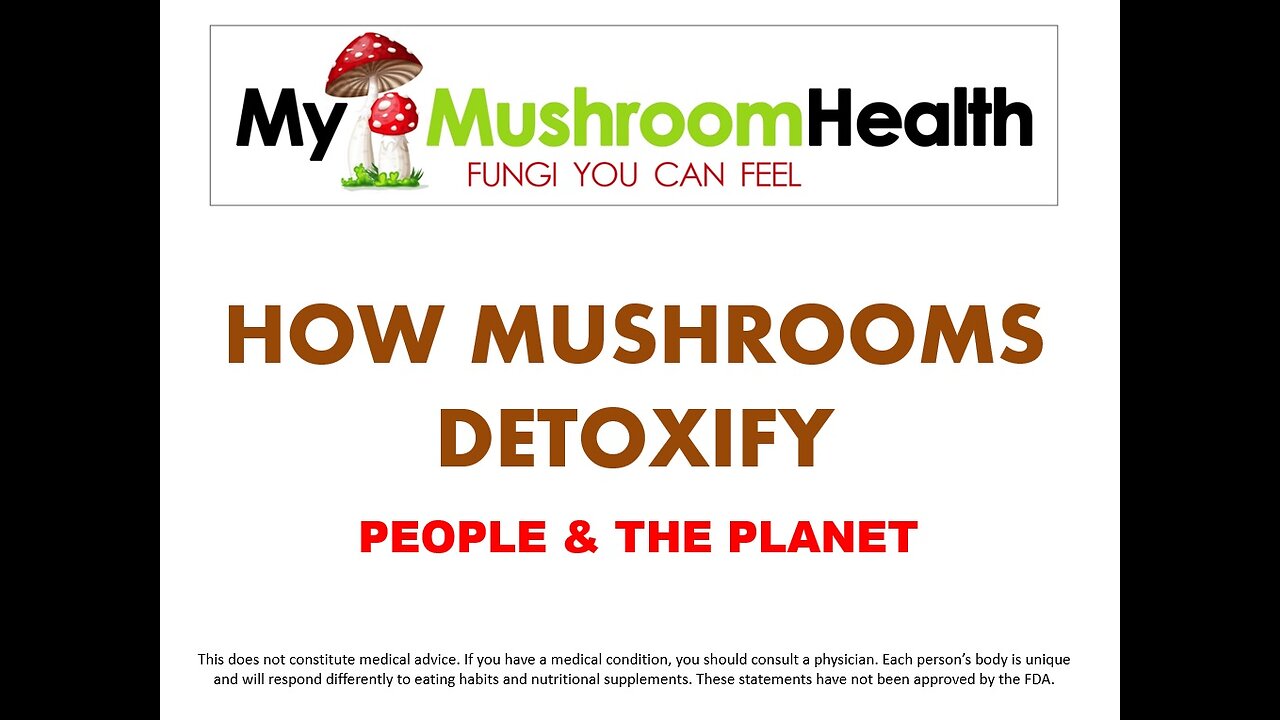Premium Only Content

How Mushrooms Detoxify people and the Planet
How Mushrooms Detoxify people and planet
Summary: Bacteria and fungi can form a wide range of molecular communication for their development and functioning. These bacterial-fungal interactions can result in dramatic changes to the nutritional influence of plants or animals (including humans). They can also result in unique contributions to biogeochemical cycles and various biotechnological processes. This means the interactions between bacteria and fungi are of central importance to agriculture, forestry, environmental science, food production, and medicine.
These bacterial-fungal interactions (BFIs) have important ramifications for the biology of the interacting partners. In recent years, research in this area has developed significantly. Contemporary studies have revealed that fungi and bacteria form physically and metabolically interdependent relationships that harbor properties distinct from those of their single components, meaning they work together to optimize the organic structure around them.
This chart shows the areas of benefit from Bacterial Fungal Interactions (BFI’s) such as Fermentation, Metabolic production, Synthetic biological interactions, Antibiotic resistance, Biocontrol, Host defense induction, Probiotic effects, organic nutrient recycling, Nutrient production and release to name just a few. See chart below
Chart credit: NCBI
https://www.ncbi.nlm.nih.gov/pmc/articles/PMC3232736/
We then assess the various forms of molecular communication that occur in BFIs, which range from antibiosis and signaling to genetic exchange.
When it comes to Mycelium mass production in antibiotic relationships, the best-known and most extensively studied category of bacterial-fungal communication is antibiosis, a chemical warfare that is typified by the diffusion of deleterious (causing harm or damage) and often chemically complex molecules from one partner to the other. Research investigating antibiosis has led to the development of numerous important antibiotics to combat microbial infections, the most famous of which is the beta-lactam antibiotic penicillin, which was developed based on the antibiosis of a Penicillium mold contaminating a Staphylococcus culture.
Because fungi in mushrooms can decompose organic compounds very efficiently and these mycelium networks can remove pollutants from the environment in a process known as micropredation, they can decontaminate environments that have been polluted by heavy metals, petroleum fuels, and pesticides.
Here’s the KEY, they do the same to our cells so consuming high quality mushroom products can assist the body with various detoxification processes.
Fungi are also one of the only organisms that can compost complex biomass, and we can grow alternatives to plastic through mycelium. This is just scratching the surface with their potential and hundreds of studies are taking place to understand these remarkable natural processes. The final point in all this is to use fungal colonies to prevent the continued production of harmful chemicals that are now beginning to show up in the umbilical cords of newborns.
-
 10:05
10:05
DIY Wife
3 years agoHow We Flip Old Furniture For Profit!
70.2K58 -
 2:14:54
2:14:54
TheSaltyCracker
9 hours agoTrump Goes Gangster ReeEEeE Stream 01-26-25
146K298 -
 4:42:13
4:42:13
Due Dissidence
18 hours agoTrump Calls To "CLEAN OUT" Gaza, Swiss ARREST Pro-Palestine Journalist, MAGA's Hollywood Makeover?
66.9K91 -
 2:02:20
2:02:20
Nerdrotic
11 hours ago $19.97 earnedDECLASSIFIED: JFK, MLK UFO Immaculate Constellation Doc | Forbidden Frontier #089
88.3K17 -
 3:00:14
3:00:14
vivafrei
19 hours agoEp. 248: "Bitcoin Jesus" Begs Trump! Rekieta Gets Plea Deal! Pardons, Deportations, Bird Flu & MORE!
206K221 -
 3:44:06
3:44:06
Rising Rhino
17 hours ago $14.24 earnedWashington Commanders Vs Philadelphia Eagles: NFL NFC Championship LIVE Watch Party
97.7K4 -
 13:00
13:00
Exploring With Nug
12 hours ago $7.28 earnedHe Went To Get A Haircut And Vanished WIthout a Trace!
79.3K3 -
 18:53
18:53
DeVory Darkins
2 days ago $33.86 earnedTrump JUST ENDED Mayor Karen Bass During HEATED Meeting
107K224 -
 21:06
21:06
Russell Brand
16 hours agoIT'S COMING
164K569 -
 21:26
21:26
Stephen Gardner
1 day ago🔥What JUST leaked out of Congress must be STOPPED NOW!
150K291